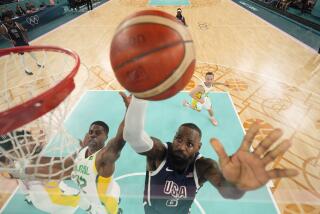Armstrong Reaches a Goal Just by Stepping on the Field
- Share via
FLORENCE, Italy — That his team took a 5-1 beating did not really matter. Well, it mattered, but not as much as you might think. Neither did it really matter that his own performance Sunday was one of his worst in months. It was the World Cup finals. He was on the field. Desmond Armstrong would not trade the moment for a free villa in Florence.
Just playing in the Cup finals, being one of the first Americans in 40 years to do so--that in itself is a victory, see, and you take victories of any kind when you grow up in the United States putting soccer posters on your wall, which means your friends think you are a little strange.
That all goes double if you are black and gifted with strong legs, and the people in your neighborhood call you names and wonder out loud why you are wasting your time with a round ball that does not go in a basket.
“Oreo cookie, that’s what the black community called me,” said Armstrong, who went to Howard High School and the University of Maryland. “Soccer was for white people, they said. It was a pretty good psychological jolt for a kid. I was 12.”
His family had chased the American dream, moving out from southwest Washington to Hyattsville, Md., Wheaton, Md., and finally to Columbia, Md., when he was 14. Armstrong, now 25, was at a friend’s house playing basketball one day after school, and the friend’s father, a soccer coach, noticed him.
“He told me I was a pretty good athlete and ought to try soccer,” Armstrong said. “I didn’t even know what it was. Had never heard of it. This was when we were in Wheaton. I was terrible the first year. All I could do was run. Then we moved to Columbia and all the kids were playing and I started getting the hang of it.”
He was among the nation’s elite by the time he was a high school senior, good enough to play in the Olympic Festival. But there were few blacks on his teams. Soccer is the poor man’s game around the world, but it is a suburban sport in the United States. He stood out. “Almost every hour,” he said, someone would ask when he planned to stop fooling around and play a real sport. It was enough to make a young man think twice.
“It is a fact that if you are a talented black athlete in the U.S., people think you should play basketball,” he said. “I’ve dealt with that all my life, heard it over and over and over. But I just stuck it out. I loved my game.”
That he did was evident, for he was not showered with rewards for being so accomplished. His high school and college teams were “failures,” he said. Not until the summer of 1987, when he played on a team that won the U.S. Soccer Federation’s National Amateur Cup, did he win anything substantial.
“I can tell you all about losing,” he said.
That summer, the Cleveland Force selected him in the first round of the Major Indoor Soccer League draft. He signed a contract and played well, but his mind often was elsewhere, looking ahead to the Olympics in South Korea, where he played on a U.S. team that had two ties and a loss in three games.
He joined the Baltimore Blast when he came back, a fine homecoming, but his heart still beat the strongest for the outdoor game.
Then his world crashed. He shattered his right leg during a Blast game. “It was the hardest part of all,” he said. “You don’t really know if you’ll ever be the same.”
It took him nine months of rehabilitation to get back on the field, another five months to rediscover his game. The U.S. team qualified for the World Cup in the interim. Armstrong regained his starting place on the U.S. squad in the months leading up to the Cup.
He played all 90 minutes in Sunday’s 5-1 loss to the Czechs, and although he was outrun, turned around and caught out of position a few times, his man did not score. Still, he had hoped to use the Cup to impress a European team enough to sign a contract. Teams in the Netherlands and France had expressed some interest. “This won’t help,” he said.
He is at a crossroads at 25. “If I don’t get to Europe off this, my career is basically over,” he said. “I would love to play two or three years over here. Otherwise, you’re looking at going back to the U.S. and making a living playing indoors. I’d probably be in law school by 1995.”
Like many American soccer players, he has a pioneer’s heart. “I just hope there are some young black kids who see me and decide to try soccer,” he said. “Maybe they’ll start earlier than I did.”






